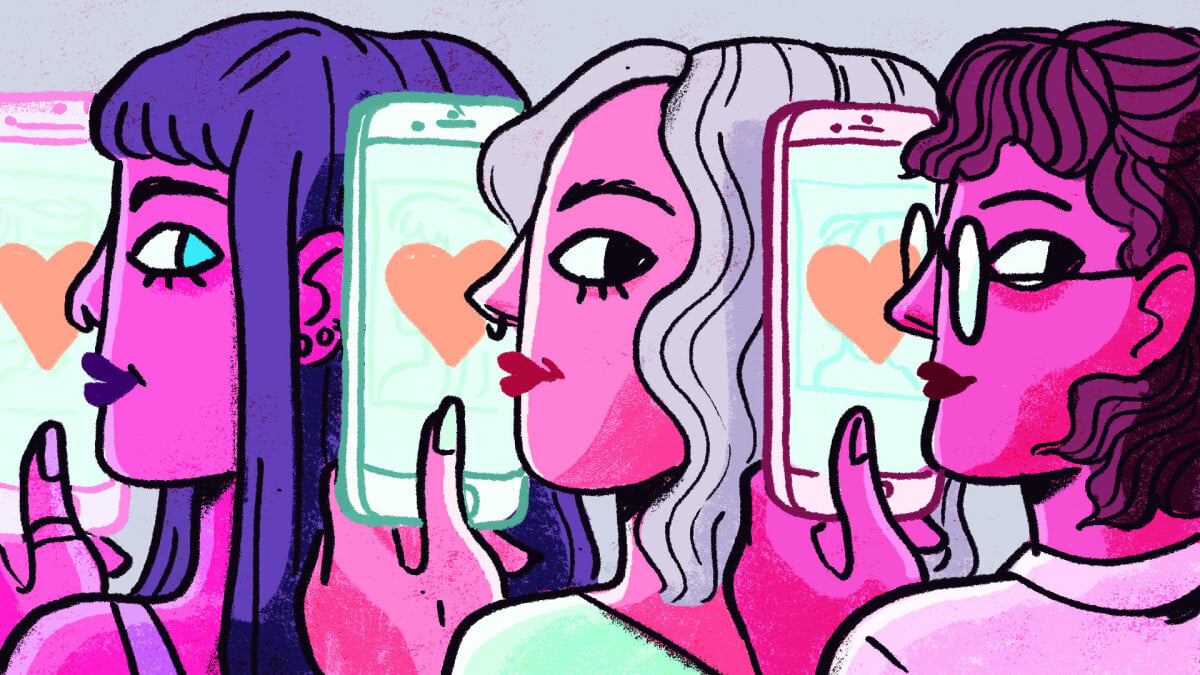Entertainment
Photo dumps are the no makeup-makeup looks of Instagram

If you’ve used Instagram recently, you’ve probably seen your mutuals post a group of seemingly random photos in “dumps.” There’s a vacation dump, a party dump, a monthly recap dump. There’s a dump for everything.
Photo dumps are styled to appear as if they’re a random assortment of photos, hastily thrown together with supposedly very little thought or curation. However, in reality, more thought goes into curating these photo dumps than a one-off picture posted to the feed. There is a whole art form to it.
So, how do you create the perfect photo dump? There are instructional TikToks, videos, and Reels that detail everything you need for the perfect photo dump. In one video, creator Jaci Marie Smith says a great selfie, a BeReal, an #OOTD picture, a random screenshot, food shot, a “personality pic,” and candid pictures are some things that when put together make the perfect photo dump. The point is to make the entire process look effortless, to give the (false) impression that these photos were chosen in the most haphazard manner.
The point is to make the entire process look effortless, to give the (false) impression that these photos were chosen in the most haphazard manner.
But in reality, photo dumps are the no makeup-makeup looks of Instagram.
Where did the no-makeup makeup looks come from?
ICYMI, no makeup-makeup looks became all the rage in 2018 when people started posting photos of themselves with purportedly more “natural” looks. This trend saw people apply makeup so craftily that it made it seem like they barely had any on in the first place. It was a way to make it seem like barely any effort had gone into achieving this supposedly “natural” glow — highlighting one’s ordinary appearance instead of concealing it — when in reality, a lot of work (and products) went into achieving that look. Instagram photo dumps are no different.
Photo dumps can tell us a lot about Gen Z culture and their relationship to social media. According to research conducted by the social media agency Flagship Social, Gen Z spends more time on social media than any other generation. They use social media as a way to brand themselves personally and professionally. However, they also resist being defined by social media and are actively seeking a healthy balance. Where millennials look for convenience, Gen Z looks for transparency and authenticity. Which is why the concept of photo dumps has been embraced so wholly by this generation.
What do photo dumps say about early Instagram culture?
When Instagram first launched in 2010, before Facebook acquired it in 2012, the only thing you could do on that app was post an incredibly grainy photo (taken through the app) with a vignette and a sepia filter stuck on it. There was no agenda, no curating, no influencing, and nothing to sell or promote. Just people posting a snippet from their day-to-day life for the world to see.
Photo dumps are reminiscent of early Instagram culture back in 2012 to 2015. The practice of photo dumping is a conscious effort by Gen Z to actively try and make the platform casual again after the platform started to become more commercialised somewhere around 2016. But it is largely a performance of informality that is more carefully curated than it wants you to think because it directly affects how people are perceived online.
“It is important to me that my dumps only have one, or maximum two, good pics so that I’m not perceived as conceited.”
“I care a lot about how I’m perceived online and offline and it does factor in how I post,” says Penlope Magnani, 23, an intern at the World Trade Organisation. “It is important to me that my dumps only have one, or maximum two, good pics so that I’m not perceived as conceited. And I don’t really use Insta Stories because I think that if I post more than five a day I’d be perceived as annoying.”
Research shows that Gen Z is constantly online, with more than half checking Instagram and YouTube at least once a day, if not more. They also spend more time on these platforms than any other generation. And since they’ve grown up in the digital era, they are very skilled at sorting through massive amounts of information at a high rate. As mentioned earlier, they use social media as a way to brand and market themselves. And in a world of Facetune, filters, and Photoshop, they are always looking to put the most authentic foot forward.
What do photo dumps say about Gen Z culture?
“Gen Z are crusaders for authentic moments in an inauthentic world. They have been raised in the rise of perfectly perfected and placed posts. Photo dumping allows a window into their—at times staged, but often very real—world. Psychologically, I think Gen Z feels the importance and power in taking control of this narrative,” says wellness consultant and psychotherapist Daryl Appleton.
Gen Z knows more about image curation than perhaps any other generation in the world. We are now watching them transition to a more authentic persona in real time.
“This generation is perhaps more aware of the idea of image creation and presenting the world with a self that is curated in a particular way. Every generation has had this to an extent, but not to the same level in the cyber world,” says UKCP psychotherapist Stephen Westcott.
“Perhaps this has meant that we are watching them publicly move from psychological self-consciousness to self-awareness, and that will involve creating content that reflects that process, i.e. from being curated perfection to curated authenticity to genuine authenticity,” he adds.
But why does Gen Z care so much about how it’s perceived online? The answer, according to digital strategy director and social media expert Louise Watson Dowell, is the world that they grew up in.
“Gen Z are crusaders for authentic moments in an inauthentic world.”
“Gen Z are digital natives. They have never known a world without social media, and so what might seem curated or a display of unfounded confidence to those in their older years is natural to them. They’re used to sharing their lives, thoughts and passions across the world wide web,” she explains, “For the generations (Baby Boomers, Gen X, etc.) who grew up under different societal expectations – don’t speak unless spoken to, don’t take up too much space in the world, keep calm and carry on – the dichotomy can be discombobulating.”
Are photo dumps really a beacon of authenticity?
The agenda behind photo dumps is understandable: Gen Z is trying to minimise the pressures of social media. If you post ten seemingly random photos without caring about how they look, you take the pressure off how you’re perceived. But as Meara McNitt, the social media director for digital marketing agency Online Optimism explains, the pressure is simply being redirected.
“Now we’re being pressured into looking effortless, which in reality is harder than the predecessor of obvious curation.”
“Now we’re being pressured into looking effortless, which in reality is harder than the predecessor of obvious curation. Rather than smiling and posing, the goal is to look captured in the moment. Where late Millennials were feeling low about not looking perfect, Gen Z is now feeling low about not looking effortless,” she says, “It’s not about sharing a collection of photos that you enjoyed, it’s purposely creating this false presentation of yourself without trying.”
Gen Z knows that authenticity is an important aspect of influencer culture, but they’re also aware of what that means from a marketing standpoint: perfection matters. If an influencer — or anyone for that matter — isn’t authentic, they will immediately get called out for it because this is a generation that thrives on presenting the realest version of itself. Yet, if they expose their imperfections in a bid to be real, someone, somewhere on social media will have a comment to pass on it.
In the end, it is hard to encapsulate an entire generation. Everyone engages with social media differently. Some dive into political and socio-economic discourse willingly, some choose to stay away. Some post a single, well curated photo because that is the impression they’d like to create, some post photo dumps.
Yet, no matter how much thought goes into selecting each image for these dumps, authenticity and informality are still at the core of it—even if it is completely performative. And we’re aware of it too. Because perception is everything. And in a world where imperfections are criticised yet realness is encouraged, the only way to be authentic is to curate it.
-

 Business6 days ago
Business6 days agoAI chip startup DEEPX secures $80M Series C at a $529M valuation
-

 Entertainment5 days ago
Entertainment5 days agoJinkx Monsoon promises ‘the queerest season of ‘Doctor Who’ you’ve ever seen!’
-

 Business5 days ago
Business5 days agoStrictlyVC London welcomes Phoenix Court and WEX
-

 Business7 days ago
Business7 days agoRetell AI lets businesses build ‘voice agents’ to answer phone calls
-

 Entertainment5 days ago
Entertainment5 days agoHow to watch every ‘Law and Order’ online in 2024
-

 Entertainment5 days ago
Entertainment5 days agoBookTok and teens: What parents need to know
-

 Business4 days ago
Business4 days agoWhy Apple’s ‘Crush’ ad is so misguided
-

 Entertainment6 days ago
Entertainment6 days ago'House of the Dragon' recap: Every death, ranked by gruesomeness




























